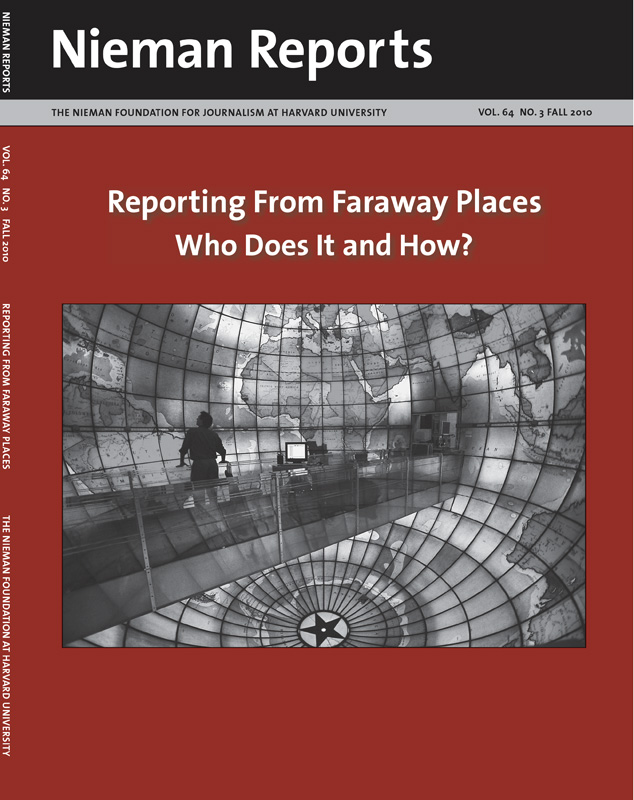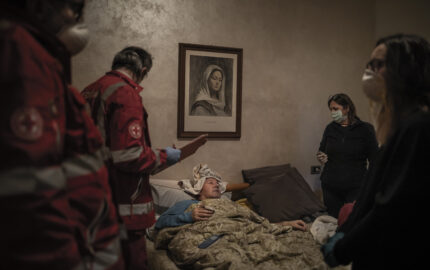
“Steve,” I told him, “you’re a great reporter. You’ve spent six weeks preparing for this story. You’ve taught yourself basic Spanish. You’ve talked to every expert on Colombia you could find. You’re going to do just fine.”
And he did. Inskeep returned to Washington five weeks later with powerful stories for NPR, including a memorable interview with an elderly village woman who, just days after Inskeep spoke with her, was killed by the very military forces she had told Inskeep she feared. His riveting stories helped to confirm NPR’s editors’ judgment of him as a major talent. He was assigned to the Pentagon and, after the September 11th attacks, to cover the war in Afghanistan, the first of many international reporting assignments. Later Inskeep was named cohost of “Morning Edition,” NPR’s flagship program.
Inskeep is just one of the many U.S. journalists who have had their first taste of overseas reporting through one of our fellowships, which have been supported by grants received from a wide range of foundations. Today, nearly 13 years after the program’s founding in 1998, more than 330 U.S. journalists have traveled overseas on IRP programs. Just over half of them have been reporters going on five-week individual reporting trips that have taken them to 92 countries, from Afghanistan to Zimbabwe. The others have been senior editors and producers who have traveled on intensive two-week expedition-style trips designed to remind top newsroom executives just why we need foreign reporting.
In the Age of Foreign Bureaus
As the founding director of the IRP, I knew we were filling a need. While there were plenty of mid-career journalism fellowship programs, none were designed to encourage more or better international coverage in the U.S. media. With a three-year start-up grant from the Pew Charitable Trusts, we created a specialized journalism fellowship with a mission of “training the next generation of foreign correspondents,” as Loren Jenkins, senior foreign editor at NPR and one of our initial advisory board members, described it.
What I could not have envisioned then were the significant shifts we’d make in our program’s approach as a result of massive changes in the journalism business. In the beginning, we saw ourselves as giving a boost to young reporters whose ambition was a foreign bureau assignment within their news organization. A decade later, many bureaus were closed, and so our focus switched to providing support for international stories—many of which are reported by independent journalists—and creating a digital platform for their publication.
In our early years, we awarded fellowships to lots of rising stars from news organizations such as The Dallas Morning News, The (Baltimore) Sun, NPR, The Boston Globe, Newsday, The Philadelphia Inquirer, and others. Our program was short—just 13 weeks—and intense. Twice a year, groups of eight to 10 journalists arrived at Johns Hopkins University’s Paul H. Nitze School of Advanced International Studies in Washington, D.C., and spent six weeks taking classes (some studied Arabic or Russian) and attending seminars with world-class scholars on international topics.
We offered what was considered to be a bold experiment in journalism fellowship programs. Instead of a break from reporting, our project gave reporters a chance to do a kind of reporting they had not done before. Each IRP Fellow went overseas for five weeks to pursue an in-depth project. Our first group of fellows, in the fall of 1998, reported from China, southern Africa, the Middle East, Armenia/Azerbaijan, Bosnia, Kenya and Chile, and their stories appeared prominently in the Inquirer, The Dallas Morning News, The (Toledo, Ohio) Blade, the San Francisco Chronicle, The Independent in London, and elsewhere. Betsy Hiel, a member of our first group of fellows, won the Edward Weintal Prize for Diplomatic Reporting for her stories from Gaza and the West Bank.
Yet even a few years into our effort it was becoming apparent that a major change was taking place in the way international news was being covered. The Sun, where I had been the bureau chief in New Delhi and Beijing in two tours in the 1980’s, went from having eight foreign bureaus at the start of 2000 to none by the end of the decade. The Globe, the Inquirer, the Chicago Tribune, and others all began to shut overseas bureaus.
Soon, that next generation of foreign correspondents we were planning to train would have no jobs to aim for. There would be no more expense account-wielding, long-term expat residents in Beijing, Nairobi, Paris, Bangkok or Rome. Much of the next era of foreign reporting was going to be done by stringers, freelancers or former staffers now applying for grants like ours.
By 2005 IRP had morphed into a prototype of a new model of journalism. As a small nonprofit, we were now underwriting dozens of international stories a year; this was more original global coverage than newspapers like the Sun, the Globe, and the Inquirer combined. Word spread quickly among journalists. By 2009, 186 U.S. journalists applied for our fellowships; this was the largest number of applications from U.S. journalists to any university-based journalism fellowship program that year.
Where does the money come from? Since 1998, we’ve received nearly $14 million in grants from individuals and foundations, which have included The Pew Charitable Trusts, Bill & Melinda Gates Foundation, The William and Flora Hewlett Foundation, John S. and James L. Knight Foundation, Carnegie Corporation of New York, Rockefeller Brothers Fund, The Stanley Foundation, and others. The foundations agree to leave the editorial decisions to us so IRP decides which journalists receive our reporting grants and which stories get covered.
In an Era of Freelancers
Today IRP is all about stories, and two-thirds of our applicants are freelancers. Each year the number of fellows who are freelancers increases; they have made up 58 percent of our fellows during the past three years. Fellows still come to IRP before they go overseas but our in-house sessions last only two weeks; reporters are too impatient to get to their story to sit for our former six-week academic stint.
RELATED ARTICLE
“Into Africa—With a Newspaper in Iowa”
- Perry BeemanFrom the beginning, we’ve encouraged reporting about the developing world on topics such as health care, environment, religion, post-conflict recovery and development, women and children’s circumstances, refugees and population issues. Of the 174 IRP Fellows we’ve funded since the program started, 82 percent of them have reported from Africa, Asia or Latin America. Woefully neglected by the mainstream media, Africa is the continent that our fellows travel to the most; 58 of our journalists—one third of the fellows so far—have reported from 30 African countries. Add up all the time they’ve spent there and it is the equivalent of five and a half years’ worth of daily reporting.
In 2009, Joanna Kakissis, a freelancer and IRP Fellow, traveled to Bangladesh where she produced a multimedia project exploring the displacement of people within that country due to global warming. Flooding, caused by drought and sea level change, has created a new intracountry category of refugees, and her stories about their plight were broadcast on the BBC/Public Radio International program “The World” and published on the front page of the International Herald Tribune.
Is this kind of nonprofit model sustainable? It’s too soon to tell. Here’s what we know: There is an abundant interest in telling foreign stories and IRP Fellows produce high-quality journalism. Each year we turn down more than 100 proposals from journalists with terrific ideas for international stories. With more funding we could support many more critically important global reporting projects and we could easily triple our annual allocation of 32 fellowships.
Fellows’ stories have won Emmy Awards, Overseas Press Club Awards, two Oscar nominations for best documentary, and other honors. Stories by IRP Fellows have been carried by almost every major U.S. news organization, including The New York Times, The Washington Post, NPR and PBS.
The stories produced by our IRP Fellows are ones that likely would not be done without the support of foundations. But is such foreign news reporting really needed? Anyone seeking news about other countries can go online and easily find plenty of information at indigenous news organizations. Yet much of this information is presented without the context that most Americans want and need. That’s what foreign correspondents at their best can do—make what is foreign seem accessible and inviting.
Today, great value remains in sending journalists to do this on-the-ground reporting in faraway places even though the economic model that once supported such a mission is gone. The challenge for all of us becomes this: Will funders continue to appreciate this as a value worth paying for? We shall see.
John Schidlovsky is the founding director of the International Reporting Project based at Johns Hopkins University’s Paul H. Nitze School of Advanced International Studies.


